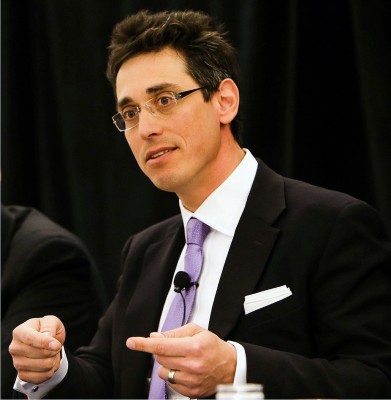
Massachusetts gubernatorial candidate Evan Falchuk filed a lawsuit Wednesday against the sponsors of Monday night’s debate in response to being un-invited to participate.
Falchuk, founder of the United Independent Party, said he received a letter in August inviting him to participate in the debate, sponsored by New England Cable News, the Worcester Telegram & Gazette and the Worcester Chamber of Commerce.
“It was presented as they put in the letter, this very important opportunity to let your voice be heard to people in Central Massachusetts,” he said. “It was going to be the only televised debate in Worcester, and they said they would be delighted if we participate.”
A copy of the letter provided in the lawsuit confirms that the sponsors did invite Falchuk and expressed hope that he would accept. Six weeks after receiving the invitation to participate, Falchuk’s invitation was retracted, as well as that of fellow independent candidate, Jeff McCormick.
Falchuk said the hosts of the debate suggested he was excluded because he did not have enough polling support, and only Republican candidate, Charlie Baker and Democratic candidate, Martha Coakley would participate.
After urging the sponsors of the debate to honor their invitation and receiving no response, Falchuk said he had no choice but to sue NECN, the Worcester Telegram & Gazette and the Worcester Chamber of Commerce for breach of contract in the Suffolk Superior Court.
The case will be tried Monday, the same day of the debate. At press time, the sponsors of the debate were unavailable for comment.
Falchuk said all candidates should have a chance to debate and present themselves to voters.
“Voters in the election are waiting until the debates to really get a sense of what the candidate’s all about,” he said. “We had to get 10,000 signatures to get on the ballot, and my team, we all collected 17,000 signatures. So for media organizations to decide that ‘Yeah, that may be true that you made the ballot, but the voters are only going to learn about two of the candidates.’ Well, that doesn’t make much sense.”
Falchuk suggested the possibility of an ulterior motive behind his dis-invitation to the debate.
“I also don’t think it’s a coincidence that there’s a lot of money that comes from the Democratic and Republican parties to support these television stations and news organizations through advertising, and they don’t want to be hearing from a voice who wants to challenge what they’re doing,” he said.
Scott Lively, another independent candidate running for governor, said Falchuk’s lawsuit raises the question of whether media organizations inherently control voter awareness by regulating which candidates participate in their debates.
“Who are these media figures to decide who the voters’ choices should be? That’s not American,” Lively said. “I think [Falchuk is] doing the right thing. I hope that he’ll stand up for the broader principle, in making sure that all the independents are included, not just himself.”
Coakley’s campaign supports Falchuk’s claim that all candidates should be included in debates, said spokeswoman Bonnie McGilpin in an email.
“Since the beginning of the general election, Martha Coakley has called for all candidates qualified for the ballot to be included in each debate as a matter of fairness,” she said. “However, this is a decision that is ultimately up to the organizers of each debate.”
Several Massachusetts residents agreed that independent candidates should be allowed to debate the big-party candidates.
Keegan Dougherty, 24, of Allston, referenced a recent Vermont gubernatorial debate, which featured independent candidates. She said independent candidates bring different perspectives to debates that should be heard.
“While some of the independent candidates did say some cooky, goofy things, they brought a lot to the table in terms of highlighting issues that wouldn’t have been highlighted otherwise,” she said.
Liam Flanagan, 66, of Brighton, said independent candidates are just as important to hear from in gubernatorial debates as their big-party opponents.
“I’ve been an activist since the 60’s, and I can remember third party candidates who were either shunned, treated differently or uninvited to debates,” he said. “[Falchuk] definitely has some arguments. What are they afraid of?”
























































































































